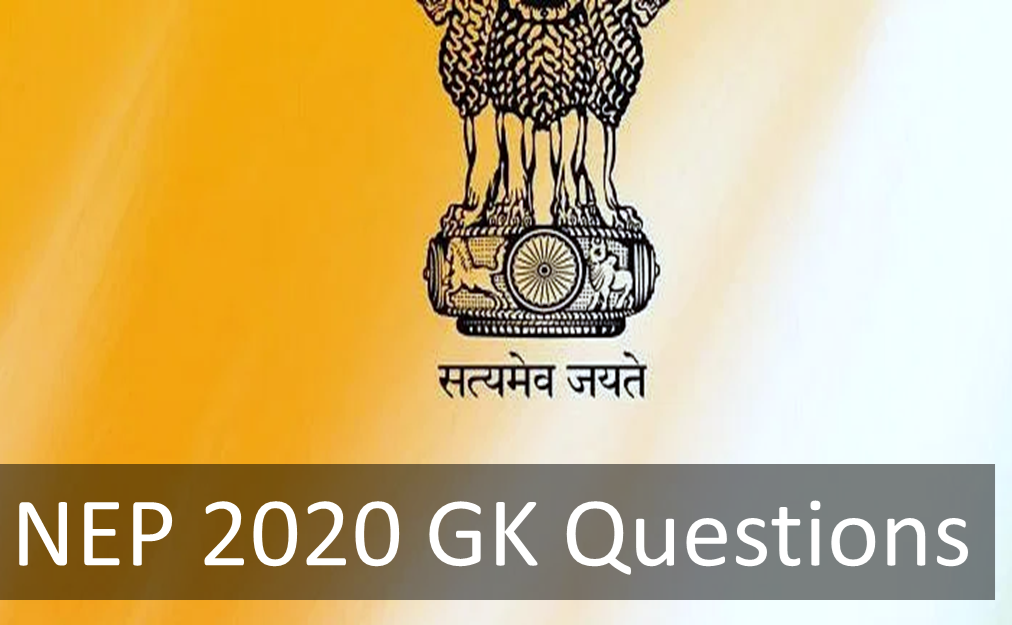National Education Policy (NEP) 2020 is India’s revolutionary change in its education system. It is the biggest educational reform of the 21st century. With these changes, the government of India hopes that India’s education system will meet the top education standards across the World.
To help you understand this policy in a better way, I have created the latest General Knowledge Quiz on NEP 2020. These questions and answers will clear all your doubts related to the policy. You may also go through this quiz if you are preparing for any teacher recruitment exam in India because NEP is one of the most important topics.
National Education Policy 2020 General Knowledge Questions and Answers
Question – 1: In January 2015, a committee under whose leadership started the consultation process for the New Education Policy?
Answer: T.S.R. Subramanian (Former Cabinet Secretary)
Question – 2: A draft of the New Education Policy (NEP) was submitted by a panel under the leadership of which former chief of ISRO in 2019?
Answer: Krishnaswamy Kasturirangan.
Question – 3: Which ministry released the Draft New Education Policy (DNEP) 2019?
Answer: Ministry of Human Resource Development.
Question – 4: How many pages were there in the Draft New Education Policy (DNEP)?
Answer: 484 Pages
Question – 5: How many consultations does the Ministry of Human Resources take to create a new education policy?
Answer: The ministry took consultation from 2.5 lakh gram panchayats, 6,600 blocks, 6,000 Urban Local Bodies (ULBs), and 676 districts.
Question – 6: The National Education Policy (NEP) has emphasised the use of which language of instruction till Class 5?
Answer: The use of the mother tongue or local language.
Question – 7: National Education Policy 2020 replaced which former education policy in India?
Answer: National Policy on Education, 1986.
Question – 8: Which 28 languages will be used as a medium of instruction (teaching) according to NEP 2020?
Answer: Assamese, Bengali, Gujarati, Hindi, Kannada, Konkani, Malayalam, Meitei (Manipuri), Marathi, Nepali, Maithili, Odia, Punjabi, Sanskrit, Sindhi, Tamil, Telugu, Urdu, English, Bodo, Khasi, Garo, Mizo, French, Hmar, Karbi, Santhali, Bhodi and Purgi.
Check other GK Questions
Question – 9: The New Education Policy is based on which formula of education?
Answer: 5+3+3+4
Question – 10: How much does the NEP 2020 aim to increase state expenditure on education?
Answer: From 3% to 6% of GDP.
Question – 11: The New Education Policy (NEP) recommends all students to learn how many languages in their school?
Answer: Three.
Question – 12: How many of the three languages recommended by the New Education Policy (NEP) to learn in the school should be Indian?
Answer: 2 languages.
Question – 13: What is the first stage of the “5+3+3+4” model of the New Education Policy?
Answer: Foundational Stage
Question – 14: What is the length of the foundational stage as per the New Education Policy?
Answer: 5 years.
Question – 15: How is the foundational stage of the New Education Policy further divided?
Answer: 3 years of preschool or Anganwadi followed by classes 1 and 2 in the primary school.
Question – 16: What should be the age of a child in the foundational stage?
Answer: 3 years to 8 years.
Question – 17: What kind of learning is promoted in the foundational stage?
Answer: Activity-based learning
Question – 18: As per the “5+3+3+4” model, what is the second stage of the education system in India?
Answer: Preparatory Stage
Question – 19: Which classes are in the Preparatory Stage?
Answer: Classes 3 to 5.
Question – 20: What should be the age of a child in the Preparatory Stage?
Answer: 8 to 10 years.
Question – 21: Students will be gradually introduced to which subjects in the Preparatory Stage?
Answer: Speaking, reading, writing, physical education, languages, art, science and mathematics.
Question – 22: What is the third stage of education as per the “5+3+3+4” model?
Answer: Middle Stage
Question – 23: What should be the age of the child studying in the middle stage?
Answer: 11 to 13 years.
Question – 24: In the middle stage, students will be introduced to more abstract concepts in which subjects?
Answer: Mathematics, Sciences, Social Sciences, Arts, and Humanities.
Question – 25: Which are the classes included in the middle stage?
Answer: Class 6th to 8th.
Question – 26: What is the fourth stage of the “5+3+3+4” model as the NEP?
Answer: Secondary Stage
Question – 27: What is the ideal age of students under the secondary stage?
Answer: 14 to 18
Question – 28: Which classes are included in the secondary stage?
Answer: 9th to 12th
Question – 29: How is the secondary stage of education further divided?
Answer: 9th & 10th classes in the first phase and 11th & 12th classes in the second phase.
Question – 30: What is the focus of study in the secondary stage?
Answer: Multidisciplinary study, coupled with depth and critical thinking with multiple options of subjects.
Question – 31: Before the board exams in class 10, in which three classes the exams will be held?
Answer: Class 2nd, 5th, and 8th.
Question – 32: Which new assessment body will be established to decide the standard of class 10th and class 12th board exams?
Answer: PARAKH
Question – 33: What is the full form of PARAKH?
Answer: Performance Assessment, Review, and Analysis of Knowledge for Holistic Development
Question – 34: How many board exams will be held in classes 10th and 12th?
Answer: 2
Question – 35: Coding will be introduced in which class?
Answer: Class 6
Question – 36: The Midday Meal Scheme will be extended to include which meal?
Answer: Breakfasts.
Question – 37: Which Philosophy course will be discontinued as per the New Education Policy?
Answer: MPhil (Master of Philosophy)
Question – 38: Which commission will be set up to regulate higher education?
Answer: Higher Education Commission of India (HECI)
Question – 39: What are the four verticals of the Higher Education Commission of India (HECI)?
Answer: NHERC, NAC, HEGC, and GEC.
Question – 40: What is the full form and purpose of NHERC?
Answer: National Higher Education Regulatory Council. It aims to regulate higher education in India including teacher education (excluding medical and legal education)
Question – 41: National Council for Teacher Education, All India Council for Technical Education, and the University Grants Commission will be replaced by which new establishment?
Answer: HEGC (Higher Education Grants Council)
Question – 42: What is the full form and purpose of GEC?
Answer: General Education Council (GEC). Its purpose will be to prepare a National Higher Education Qualification Framework (NHEQF).
Question – 43: The National Council for Teacher Education will come under which department?
Answer: General Education Council (GEC).
Question – 44: Which agency will have extra responsibility for conducting entrance examinations for admissions to universities across the country apart from conducting NEET and JEE Main?
Answer: NTA (National Testing Agency)
Question – 45: In August 2021, Which state became the first state in India to issue an order to implement NEP?
Answer: Karnataka.
Question – 46: By which year, a 4-year Bachelor of Education will be mandatory to become a teacher in India?
Answer: 2030
Question – 47: Which authority has the responsibility of framing a National Curriculum Framework for Teacher Education and National Professional Standards for Teachers as per NEP?
Answer: The National Council for Teacher Education
Question – 48: NITI Aayog partnered with which EdTech company to provide free access to its tech-driven learning programs to engineering aspirants from 112 districts in line with NEP?
Answer: Byju’s
Question – 49: Who compared the New Education Policy (NEP) 2020 with the Morrill Land-Grant Acts of the United States and called it a “Morril Moment” for India?
Answer: Director of IIT Delhi, V. Ramgopal Rao
Question – 50: Who is the head of the National Education Commission of India?
Answer: The Prime Minister of India.











